Reflective Summary on Graduate Challenge for Business Skills
VerifiedAdded on 2023/01/03
|7
|2285
|85
Report
AI Summary
This report presents a reflective summary of a student's experience in a university graduate challenge, focusing on the development of essential business skills through participation in three distinct challenges: the apprentice challenge, the presentation challenge, and the t-shirt challenge. The student reflects on the acquisition and improvement of skills such as teamwork, leadership, communication, innovation, branding, budgeting, and time management. The report details the student's experiences in each challenge, highlighting the application of theoretical frameworks such as Tuckman's stages of team development and the practical implications of business concepts like marketing strategies and financial planning. Furthermore, the report includes a self-assessment of the student's current skill levels and outlines a comprehensive action plan for continued skill development over the next three years, encompassing strategies to enhance communication, teamwork, and business acumen through participation in various activities, workshops, and academic resources.
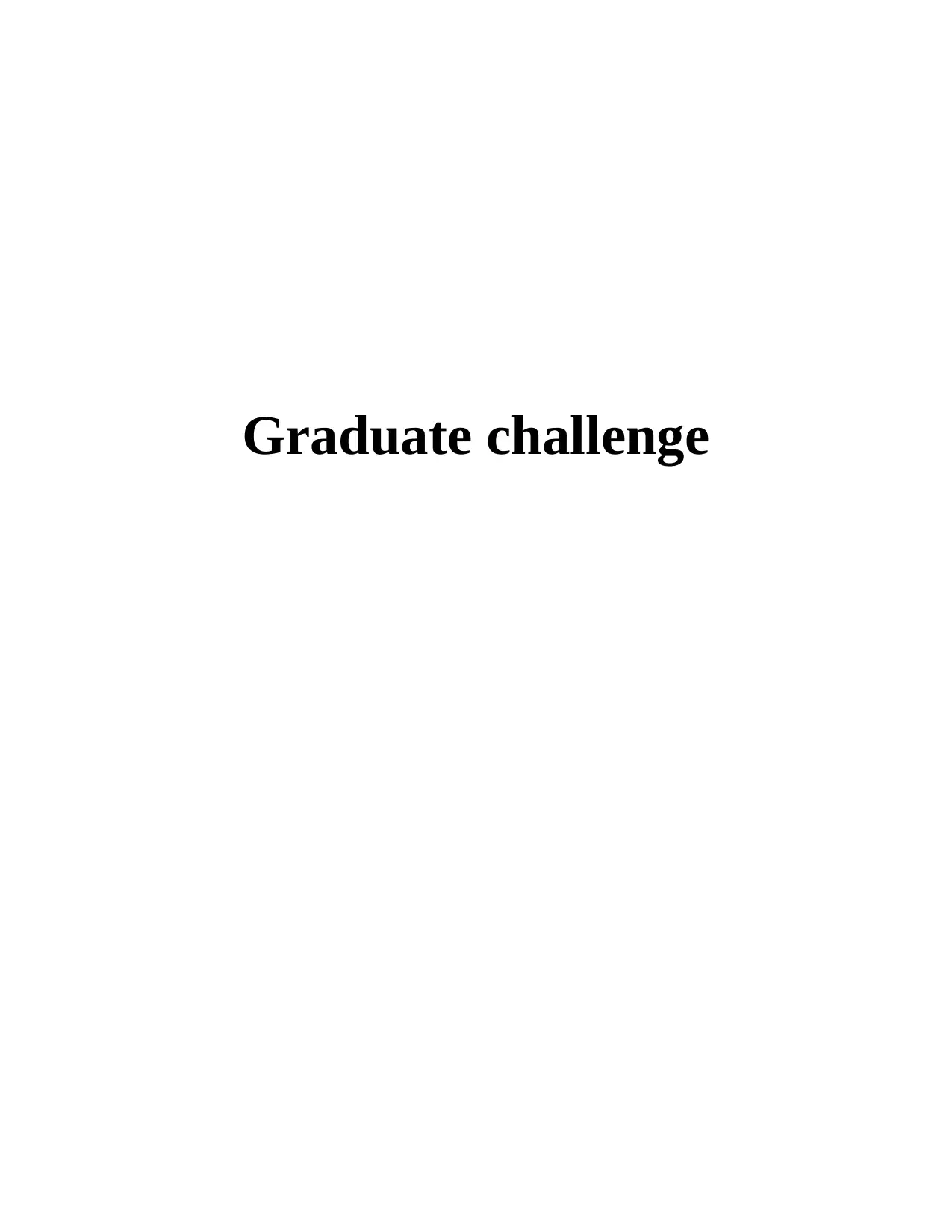
Graduate challenge
Paraphrase This Document
Need a fresh take? Get an instant paraphrase of this document with our AI Paraphraser
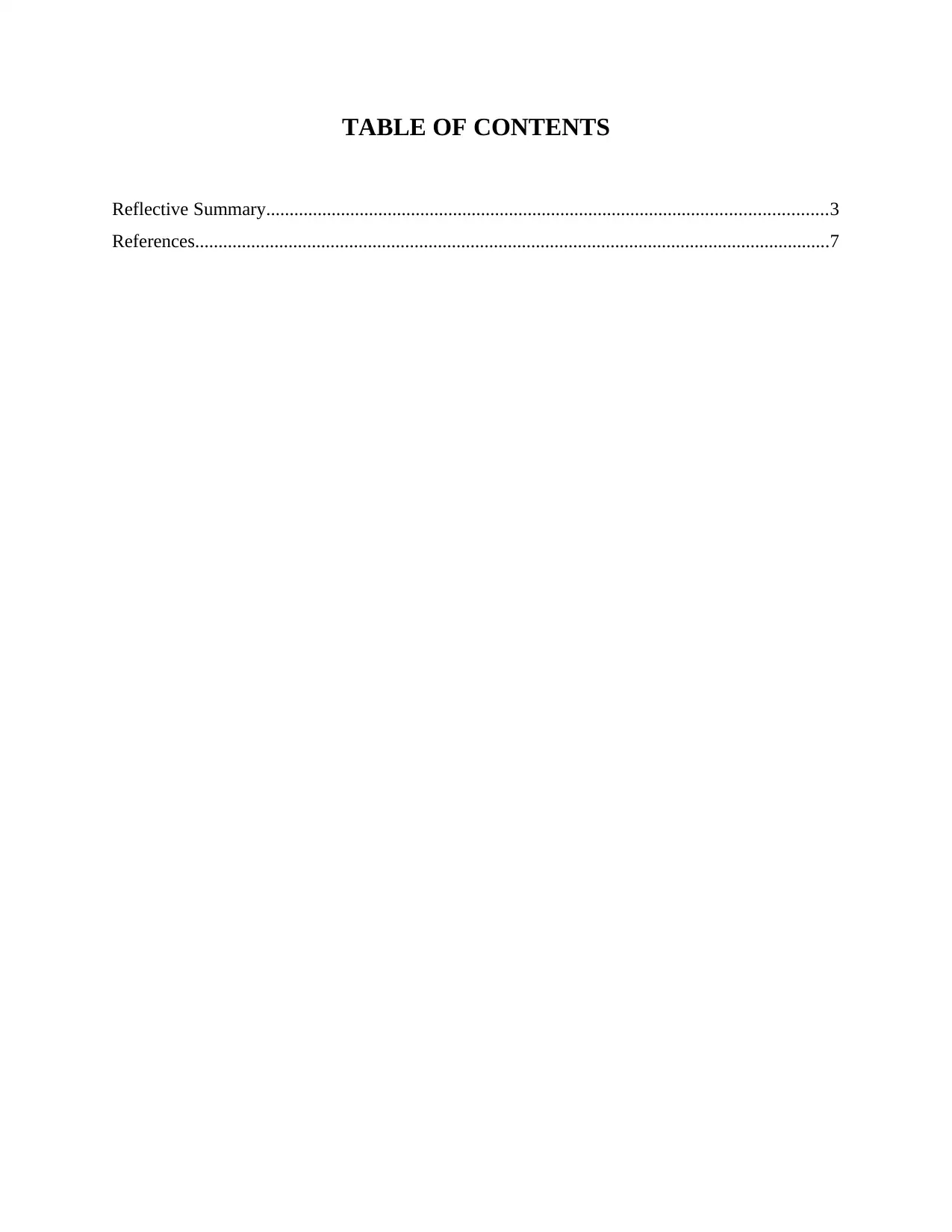
TABLE OF CONTENTS
Reflective Summary........................................................................................................................3
References........................................................................................................................................7
Reflective Summary........................................................................................................................3
References........................................................................................................................................7
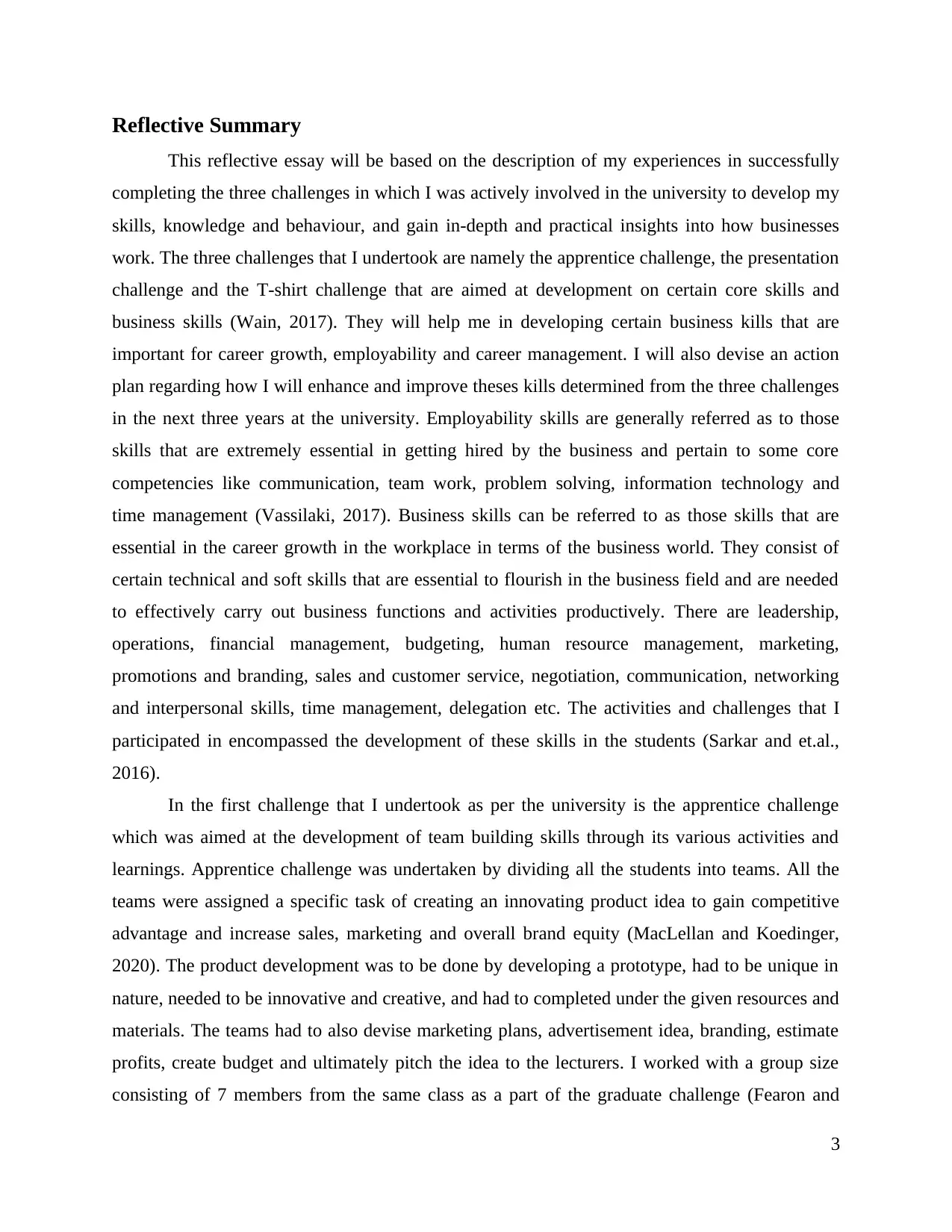
Reflective Summary
This reflective essay will be based on the description of my experiences in successfully
completing the three challenges in which I was actively involved in the university to develop my
skills, knowledge and behaviour, and gain in-depth and practical insights into how businesses
work. The three challenges that I undertook are namely the apprentice challenge, the presentation
challenge and the T-shirt challenge that are aimed at development on certain core skills and
business skills (Wain, 2017). They will help me in developing certain business kills that are
important for career growth, employability and career management. I will also devise an action
plan regarding how I will enhance and improve theses kills determined from the three challenges
in the next three years at the university. Employability skills are generally referred as to those
skills that are extremely essential in getting hired by the business and pertain to some core
competencies like communication, team work, problem solving, information technology and
time management (Vassilaki, 2017). Business skills can be referred to as those skills that are
essential in the career growth in the workplace in terms of the business world. They consist of
certain technical and soft skills that are essential to flourish in the business field and are needed
to effectively carry out business functions and activities productively. There are leadership,
operations, financial management, budgeting, human resource management, marketing,
promotions and branding, sales and customer service, negotiation, communication, networking
and interpersonal skills, time management, delegation etc. The activities and challenges that I
participated in encompassed the development of these skills in the students (Sarkar and et.al.,
2016).
In the first challenge that I undertook as per the university is the apprentice challenge
which was aimed at the development of team building skills through its various activities and
learnings. Apprentice challenge was undertaken by dividing all the students into teams. All the
teams were assigned a specific task of creating an innovating product idea to gain competitive
advantage and increase sales, marketing and overall brand equity (MacLellan and Koedinger,
2020). The product development was to be done by developing a prototype, had to be unique in
nature, needed to be innovative and creative, and had to completed under the given resources and
materials. The teams had to also devise marketing plans, advertisement idea, branding, estimate
profits, create budget and ultimately pitch the idea to the lecturers. I worked with a group size
consisting of 7 members from the same class as a part of the graduate challenge (Fearon and
3
This reflective essay will be based on the description of my experiences in successfully
completing the three challenges in which I was actively involved in the university to develop my
skills, knowledge and behaviour, and gain in-depth and practical insights into how businesses
work. The three challenges that I undertook are namely the apprentice challenge, the presentation
challenge and the T-shirt challenge that are aimed at development on certain core skills and
business skills (Wain, 2017). They will help me in developing certain business kills that are
important for career growth, employability and career management. I will also devise an action
plan regarding how I will enhance and improve theses kills determined from the three challenges
in the next three years at the university. Employability skills are generally referred as to those
skills that are extremely essential in getting hired by the business and pertain to some core
competencies like communication, team work, problem solving, information technology and
time management (Vassilaki, 2017). Business skills can be referred to as those skills that are
essential in the career growth in the workplace in terms of the business world. They consist of
certain technical and soft skills that are essential to flourish in the business field and are needed
to effectively carry out business functions and activities productively. There are leadership,
operations, financial management, budgeting, human resource management, marketing,
promotions and branding, sales and customer service, negotiation, communication, networking
and interpersonal skills, time management, delegation etc. The activities and challenges that I
participated in encompassed the development of these skills in the students (Sarkar and et.al.,
2016).
In the first challenge that I undertook as per the university is the apprentice challenge
which was aimed at the development of team building skills through its various activities and
learnings. Apprentice challenge was undertaken by dividing all the students into teams. All the
teams were assigned a specific task of creating an innovating product idea to gain competitive
advantage and increase sales, marketing and overall brand equity (MacLellan and Koedinger,
2020). The product development was to be done by developing a prototype, had to be unique in
nature, needed to be innovative and creative, and had to completed under the given resources and
materials. The teams had to also devise marketing plans, advertisement idea, branding, estimate
profits, create budget and ultimately pitch the idea to the lecturers. I worked with a group size
consisting of 7 members from the same class as a part of the graduate challenge (Fearon and
3
⊘ This is a preview!⊘
Do you want full access?
Subscribe today to unlock all pages.

Trusted by 1+ million students worldwide
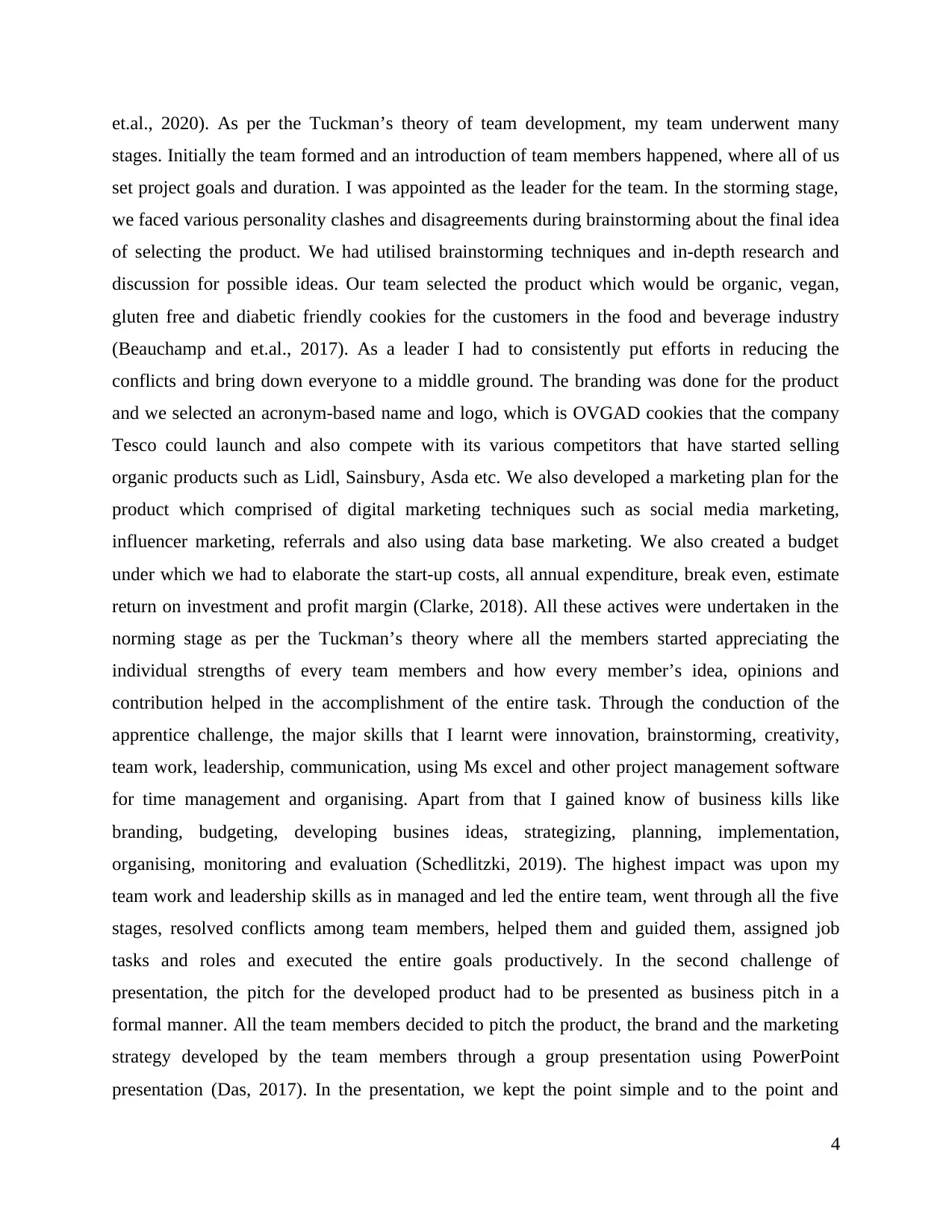
et.al., 2020). As per the Tuckman’s theory of team development, my team underwent many
stages. Initially the team formed and an introduction of team members happened, where all of us
set project goals and duration. I was appointed as the leader for the team. In the storming stage,
we faced various personality clashes and disagreements during brainstorming about the final idea
of selecting the product. We had utilised brainstorming techniques and in-depth research and
discussion for possible ideas. Our team selected the product which would be organic, vegan,
gluten free and diabetic friendly cookies for the customers in the food and beverage industry
(Beauchamp and et.al., 2017). As a leader I had to consistently put efforts in reducing the
conflicts and bring down everyone to a middle ground. The branding was done for the product
and we selected an acronym-based name and logo, which is OVGAD cookies that the company
Tesco could launch and also compete with its various competitors that have started selling
organic products such as Lidl, Sainsbury, Asda etc. We also developed a marketing plan for the
product which comprised of digital marketing techniques such as social media marketing,
influencer marketing, referrals and also using data base marketing. We also created a budget
under which we had to elaborate the start-up costs, all annual expenditure, break even, estimate
return on investment and profit margin (Clarke, 2018). All these actives were undertaken in the
norming stage as per the Tuckman’s theory where all the members started appreciating the
individual strengths of every team members and how every member’s idea, opinions and
contribution helped in the accomplishment of the entire task. Through the conduction of the
apprentice challenge, the major skills that I learnt were innovation, brainstorming, creativity,
team work, leadership, communication, using Ms excel and other project management software
for time management and organising. Apart from that I gained know of business kills like
branding, budgeting, developing busines ideas, strategizing, planning, implementation,
organising, monitoring and evaluation (Schedlitzki, 2019). The highest impact was upon my
team work and leadership skills as in managed and led the entire team, went through all the five
stages, resolved conflicts among team members, helped them and guided them, assigned job
tasks and roles and executed the entire goals productively. In the second challenge of
presentation, the pitch for the developed product had to be presented as business pitch in a
formal manner. All the team members decided to pitch the product, the brand and the marketing
strategy developed by the team members through a group presentation using PowerPoint
presentation (Das, 2017). In the presentation, we kept the point simple and to the point and
4
stages. Initially the team formed and an introduction of team members happened, where all of us
set project goals and duration. I was appointed as the leader for the team. In the storming stage,
we faced various personality clashes and disagreements during brainstorming about the final idea
of selecting the product. We had utilised brainstorming techniques and in-depth research and
discussion for possible ideas. Our team selected the product which would be organic, vegan,
gluten free and diabetic friendly cookies for the customers in the food and beverage industry
(Beauchamp and et.al., 2017). As a leader I had to consistently put efforts in reducing the
conflicts and bring down everyone to a middle ground. The branding was done for the product
and we selected an acronym-based name and logo, which is OVGAD cookies that the company
Tesco could launch and also compete with its various competitors that have started selling
organic products such as Lidl, Sainsbury, Asda etc. We also developed a marketing plan for the
product which comprised of digital marketing techniques such as social media marketing,
influencer marketing, referrals and also using data base marketing. We also created a budget
under which we had to elaborate the start-up costs, all annual expenditure, break even, estimate
return on investment and profit margin (Clarke, 2018). All these actives were undertaken in the
norming stage as per the Tuckman’s theory where all the members started appreciating the
individual strengths of every team members and how every member’s idea, opinions and
contribution helped in the accomplishment of the entire task. Through the conduction of the
apprentice challenge, the major skills that I learnt were innovation, brainstorming, creativity,
team work, leadership, communication, using Ms excel and other project management software
for time management and organising. Apart from that I gained know of business kills like
branding, budgeting, developing busines ideas, strategizing, planning, implementation,
organising, monitoring and evaluation (Schedlitzki, 2019). The highest impact was upon my
team work and leadership skills as in managed and led the entire team, went through all the five
stages, resolved conflicts among team members, helped them and guided them, assigned job
tasks and roles and executed the entire goals productively. In the second challenge of
presentation, the pitch for the developed product had to be presented as business pitch in a
formal manner. All the team members decided to pitch the product, the brand and the marketing
strategy developed by the team members through a group presentation using PowerPoint
presentation (Das, 2017). In the presentation, we kept the point simple and to the point and
4
Paraphrase This Document
Need a fresh take? Get an instant paraphrase of this document with our AI Paraphraser
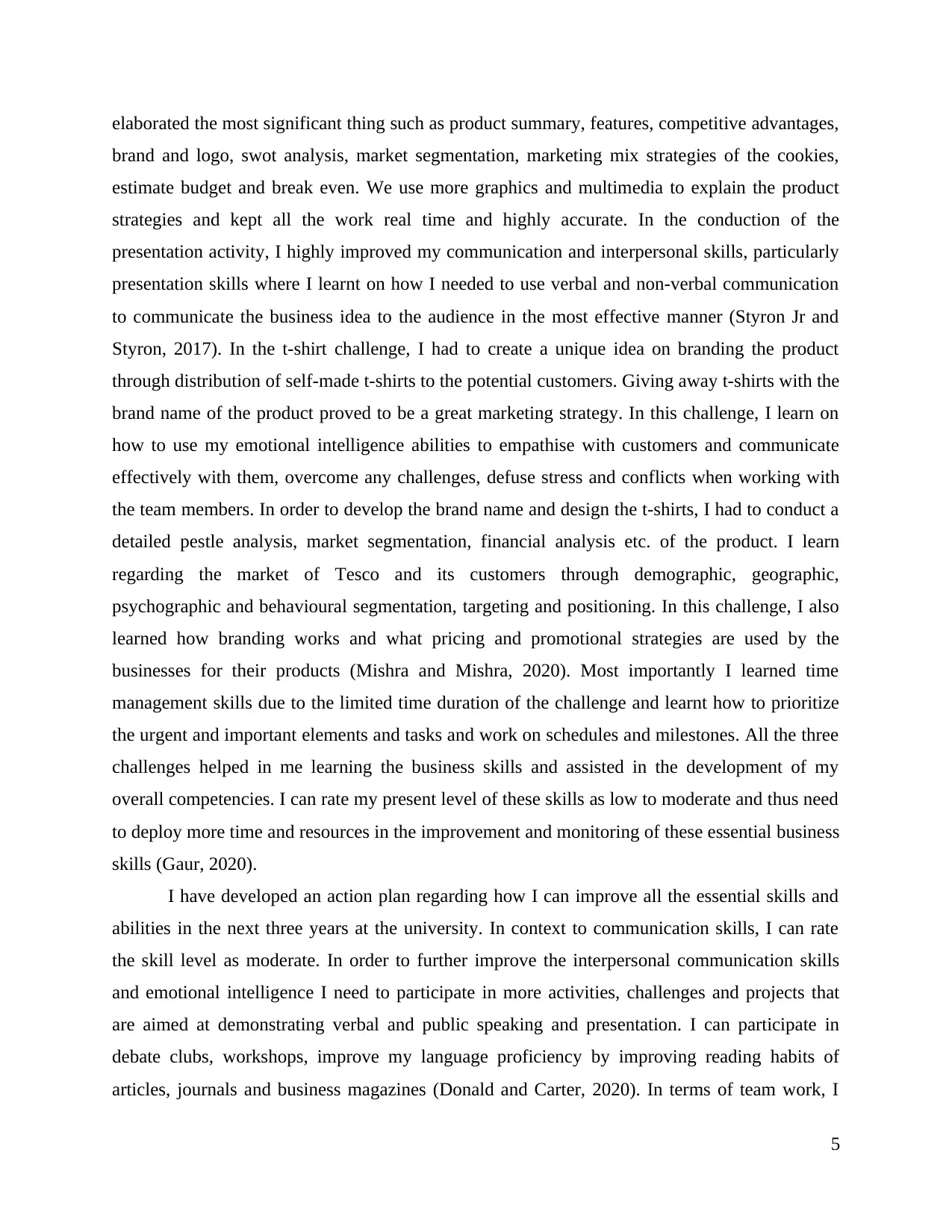
elaborated the most significant thing such as product summary, features, competitive advantages,
brand and logo, swot analysis, market segmentation, marketing mix strategies of the cookies,
estimate budget and break even. We use more graphics and multimedia to explain the product
strategies and kept all the work real time and highly accurate. In the conduction of the
presentation activity, I highly improved my communication and interpersonal skills, particularly
presentation skills where I learnt on how I needed to use verbal and non-verbal communication
to communicate the business idea to the audience in the most effective manner (Styron Jr and
Styron, 2017). In the t-shirt challenge, I had to create a unique idea on branding the product
through distribution of self-made t-shirts to the potential customers. Giving away t-shirts with the
brand name of the product proved to be a great marketing strategy. In this challenge, I learn on
how to use my emotional intelligence abilities to empathise with customers and communicate
effectively with them, overcome any challenges, defuse stress and conflicts when working with
the team members. In order to develop the brand name and design the t-shirts, I had to conduct a
detailed pestle analysis, market segmentation, financial analysis etc. of the product. I learn
regarding the market of Tesco and its customers through demographic, geographic,
psychographic and behavioural segmentation, targeting and positioning. In this challenge, I also
learned how branding works and what pricing and promotional strategies are used by the
businesses for their products (Mishra and Mishra, 2020). Most importantly I learned time
management skills due to the limited time duration of the challenge and learnt how to prioritize
the urgent and important elements and tasks and work on schedules and milestones. All the three
challenges helped in me learning the business skills and assisted in the development of my
overall competencies. I can rate my present level of these skills as low to moderate and thus need
to deploy more time and resources in the improvement and monitoring of these essential business
skills (Gaur, 2020).
I have developed an action plan regarding how I can improve all the essential skills and
abilities in the next three years at the university. In context to communication skills, I can rate
the skill level as moderate. In order to further improve the interpersonal communication skills
and emotional intelligence I need to participate in more activities, challenges and projects that
are aimed at demonstrating verbal and public speaking and presentation. I can participate in
debate clubs, workshops, improve my language proficiency by improving reading habits of
articles, journals and business magazines (Donald and Carter, 2020). In terms of team work, I
5
brand and logo, swot analysis, market segmentation, marketing mix strategies of the cookies,
estimate budget and break even. We use more graphics and multimedia to explain the product
strategies and kept all the work real time and highly accurate. In the conduction of the
presentation activity, I highly improved my communication and interpersonal skills, particularly
presentation skills where I learnt on how I needed to use verbal and non-verbal communication
to communicate the business idea to the audience in the most effective manner (Styron Jr and
Styron, 2017). In the t-shirt challenge, I had to create a unique idea on branding the product
through distribution of self-made t-shirts to the potential customers. Giving away t-shirts with the
brand name of the product proved to be a great marketing strategy. In this challenge, I learn on
how to use my emotional intelligence abilities to empathise with customers and communicate
effectively with them, overcome any challenges, defuse stress and conflicts when working with
the team members. In order to develop the brand name and design the t-shirts, I had to conduct a
detailed pestle analysis, market segmentation, financial analysis etc. of the product. I learn
regarding the market of Tesco and its customers through demographic, geographic,
psychographic and behavioural segmentation, targeting and positioning. In this challenge, I also
learned how branding works and what pricing and promotional strategies are used by the
businesses for their products (Mishra and Mishra, 2020). Most importantly I learned time
management skills due to the limited time duration of the challenge and learnt how to prioritize
the urgent and important elements and tasks and work on schedules and milestones. All the three
challenges helped in me learning the business skills and assisted in the development of my
overall competencies. I can rate my present level of these skills as low to moderate and thus need
to deploy more time and resources in the improvement and monitoring of these essential business
skills (Gaur, 2020).
I have developed an action plan regarding how I can improve all the essential skills and
abilities in the next three years at the university. In context to communication skills, I can rate
the skill level as moderate. In order to further improve the interpersonal communication skills
and emotional intelligence I need to participate in more activities, challenges and projects that
are aimed at demonstrating verbal and public speaking and presentation. I can participate in
debate clubs, workshops, improve my language proficiency by improving reading habits of
articles, journals and business magazines (Donald and Carter, 2020). In terms of team work, I
5
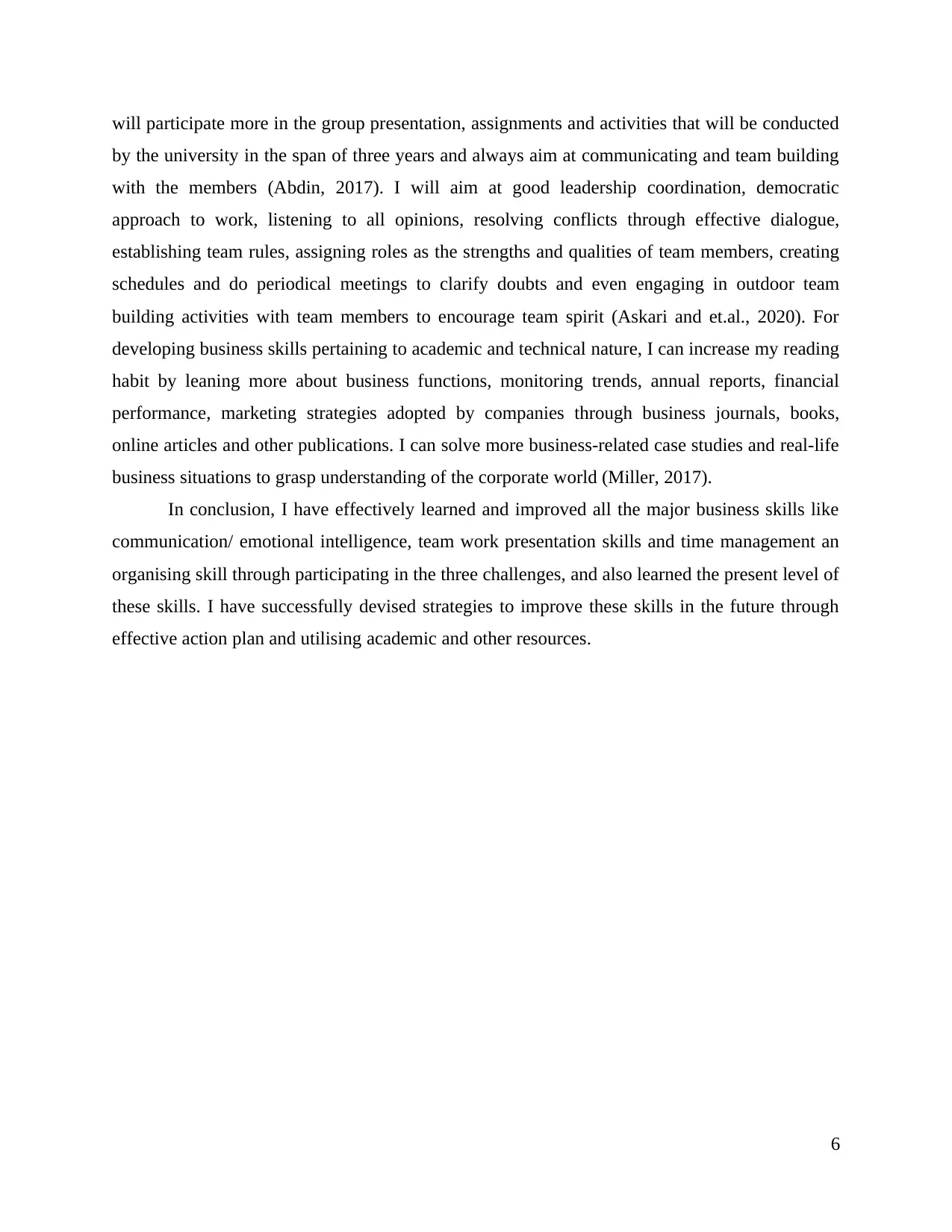
will participate more in the group presentation, assignments and activities that will be conducted
by the university in the span of three years and always aim at communicating and team building
with the members (Abdin, 2017). I will aim at good leadership coordination, democratic
approach to work, listening to all opinions, resolving conflicts through effective dialogue,
establishing team rules, assigning roles as the strengths and qualities of team members, creating
schedules and do periodical meetings to clarify doubts and even engaging in outdoor team
building activities with team members to encourage team spirit (Askari and et.al., 2020). For
developing business skills pertaining to academic and technical nature, I can increase my reading
habit by leaning more about business functions, monitoring trends, annual reports, financial
performance, marketing strategies adopted by companies through business journals, books,
online articles and other publications. I can solve more business-related case studies and real-life
business situations to grasp understanding of the corporate world (Miller, 2017).
In conclusion, I have effectively learned and improved all the major business skills like
communication/ emotional intelligence, team work presentation skills and time management an
organising skill through participating in the three challenges, and also learned the present level of
these skills. I have successfully devised strategies to improve these skills in the future through
effective action plan and utilising academic and other resources.
6
by the university in the span of three years and always aim at communicating and team building
with the members (Abdin, 2017). I will aim at good leadership coordination, democratic
approach to work, listening to all opinions, resolving conflicts through effective dialogue,
establishing team rules, assigning roles as the strengths and qualities of team members, creating
schedules and do periodical meetings to clarify doubts and even engaging in outdoor team
building activities with team members to encourage team spirit (Askari and et.al., 2020). For
developing business skills pertaining to academic and technical nature, I can increase my reading
habit by leaning more about business functions, monitoring trends, annual reports, financial
performance, marketing strategies adopted by companies through business journals, books,
online articles and other publications. I can solve more business-related case studies and real-life
business situations to grasp understanding of the corporate world (Miller, 2017).
In conclusion, I have effectively learned and improved all the major business skills like
communication/ emotional intelligence, team work presentation skills and time management an
organising skill through participating in the three challenges, and also learned the present level of
these skills. I have successfully devised strategies to improve these skills in the future through
effective action plan and utilising academic and other resources.
6
⊘ This is a preview!⊘
Do you want full access?
Subscribe today to unlock all pages.

Trusted by 1+ million students worldwide
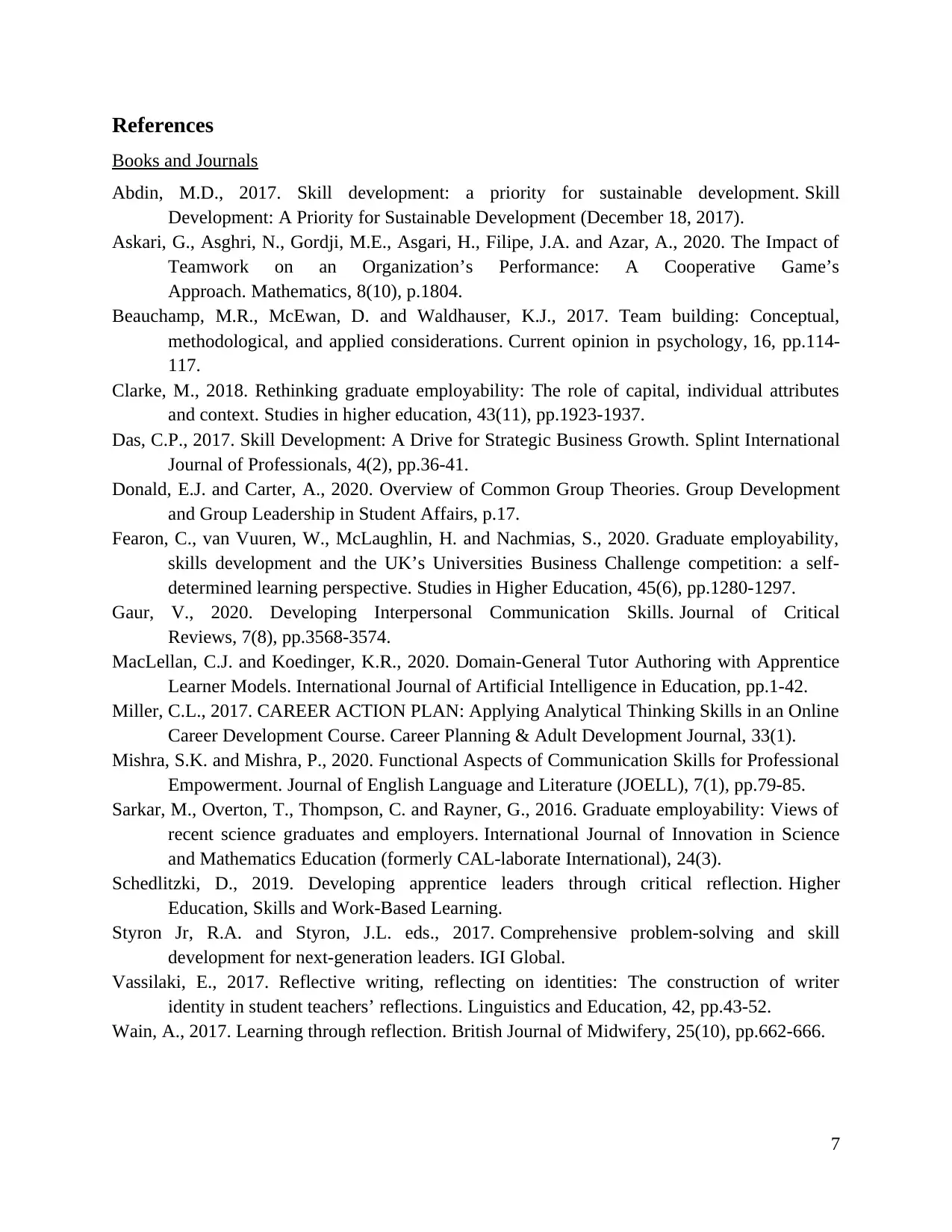
References
Books and Journals
Abdin, M.D., 2017. Skill development: a priority for sustainable development. Skill
Development: A Priority for Sustainable Development (December 18, 2017).
Askari, G., Asghri, N., Gordji, M.E., Asgari, H., Filipe, J.A. and Azar, A., 2020. The Impact of
Teamwork on an Organization’s Performance: A Cooperative Game’s
Approach. Mathematics, 8(10), p.1804.
Beauchamp, M.R., McEwan, D. and Waldhauser, K.J., 2017. Team building: Conceptual,
methodological, and applied considerations. Current opinion in psychology, 16, pp.114-
117.
Clarke, M., 2018. Rethinking graduate employability: The role of capital, individual attributes
and context. Studies in higher education, 43(11), pp.1923-1937.
Das, C.P., 2017. Skill Development: A Drive for Strategic Business Growth. Splint International
Journal of Professionals, 4(2), pp.36-41.
Donald, E.J. and Carter, A., 2020. Overview of Common Group Theories. Group Development
and Group Leadership in Student Affairs, p.17.
Fearon, C., van Vuuren, W., McLaughlin, H. and Nachmias, S., 2020. Graduate employability,
skills development and the UK’s Universities Business Challenge competition: a self-
determined learning perspective. Studies in Higher Education, 45(6), pp.1280-1297.
Gaur, V., 2020. Developing Interpersonal Communication Skills. Journal of Critical
Reviews, 7(8), pp.3568-3574.
MacLellan, C.J. and Koedinger, K.R., 2020. Domain-General Tutor Authoring with Apprentice
Learner Models. International Journal of Artificial Intelligence in Education, pp.1-42.
Miller, C.L., 2017. CAREER ACTION PLAN: Applying Analytical Thinking Skills in an Online
Career Development Course. Career Planning & Adult Development Journal, 33(1).
Mishra, S.K. and Mishra, P., 2020. Functional Aspects of Communication Skills for Professional
Empowerment. Journal of English Language and Literature (JOELL), 7(1), pp.79-85.
Sarkar, M., Overton, T., Thompson, C. and Rayner, G., 2016. Graduate employability: Views of
recent science graduates and employers. International Journal of Innovation in Science
and Mathematics Education (formerly CAL-laborate International), 24(3).
Schedlitzki, D., 2019. Developing apprentice leaders through critical reflection. Higher
Education, Skills and Work-Based Learning.
Styron Jr, R.A. and Styron, J.L. eds., 2017. Comprehensive problem-solving and skill
development for next-generation leaders. IGI Global.
Vassilaki, E., 2017. Reflective writing, reflecting on identities: The construction of writer
identity in student teachers’ reflections. Linguistics and Education, 42, pp.43-52.
Wain, A., 2017. Learning through reflection. British Journal of Midwifery, 25(10), pp.662-666.
7
Books and Journals
Abdin, M.D., 2017. Skill development: a priority for sustainable development. Skill
Development: A Priority for Sustainable Development (December 18, 2017).
Askari, G., Asghri, N., Gordji, M.E., Asgari, H., Filipe, J.A. and Azar, A., 2020. The Impact of
Teamwork on an Organization’s Performance: A Cooperative Game’s
Approach. Mathematics, 8(10), p.1804.
Beauchamp, M.R., McEwan, D. and Waldhauser, K.J., 2017. Team building: Conceptual,
methodological, and applied considerations. Current opinion in psychology, 16, pp.114-
117.
Clarke, M., 2018. Rethinking graduate employability: The role of capital, individual attributes
and context. Studies in higher education, 43(11), pp.1923-1937.
Das, C.P., 2017. Skill Development: A Drive for Strategic Business Growth. Splint International
Journal of Professionals, 4(2), pp.36-41.
Donald, E.J. and Carter, A., 2020. Overview of Common Group Theories. Group Development
and Group Leadership in Student Affairs, p.17.
Fearon, C., van Vuuren, W., McLaughlin, H. and Nachmias, S., 2020. Graduate employability,
skills development and the UK’s Universities Business Challenge competition: a self-
determined learning perspective. Studies in Higher Education, 45(6), pp.1280-1297.
Gaur, V., 2020. Developing Interpersonal Communication Skills. Journal of Critical
Reviews, 7(8), pp.3568-3574.
MacLellan, C.J. and Koedinger, K.R., 2020. Domain-General Tutor Authoring with Apprentice
Learner Models. International Journal of Artificial Intelligence in Education, pp.1-42.
Miller, C.L., 2017. CAREER ACTION PLAN: Applying Analytical Thinking Skills in an Online
Career Development Course. Career Planning & Adult Development Journal, 33(1).
Mishra, S.K. and Mishra, P., 2020. Functional Aspects of Communication Skills for Professional
Empowerment. Journal of English Language and Literature (JOELL), 7(1), pp.79-85.
Sarkar, M., Overton, T., Thompson, C. and Rayner, G., 2016. Graduate employability: Views of
recent science graduates and employers. International Journal of Innovation in Science
and Mathematics Education (formerly CAL-laborate International), 24(3).
Schedlitzki, D., 2019. Developing apprentice leaders through critical reflection. Higher
Education, Skills and Work-Based Learning.
Styron Jr, R.A. and Styron, J.L. eds., 2017. Comprehensive problem-solving and skill
development for next-generation leaders. IGI Global.
Vassilaki, E., 2017. Reflective writing, reflecting on identities: The construction of writer
identity in student teachers’ reflections. Linguistics and Education, 42, pp.43-52.
Wain, A., 2017. Learning through reflection. British Journal of Midwifery, 25(10), pp.662-666.
7
1 out of 7
Related Documents
Your All-in-One AI-Powered Toolkit for Academic Success.
+13062052269
info@desklib.com
Available 24*7 on WhatsApp / Email
![[object Object]](/_next/static/media/star-bottom.7253800d.svg)
Unlock your academic potential
Copyright © 2020–2026 A2Z Services. All Rights Reserved. Developed and managed by ZUCOL.



